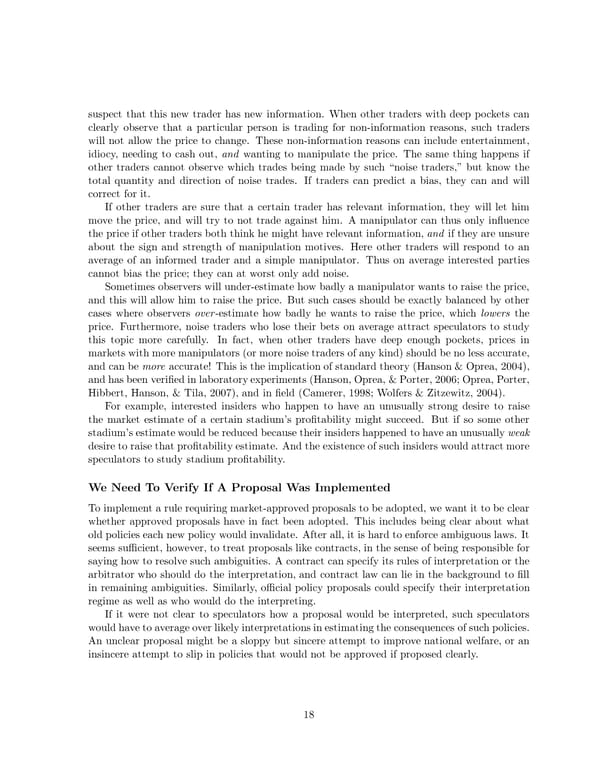suspect that this new trader has new information. When other traders with deep pockets can clearly observe that a particular person is trading for non-information reasons, such traders will not allow the price to change. These non-information reasons can include entertainment, idiocy, needing to cash out, and wanting to manipulate the price. The same thing happens if other traders cannot observe which trades being made by such “noise traders,” but know the total quantity and direction of noise trades. If traders can predict a bias, they can and will correct for it. If other traders are sure that a certain trader has relevant information, they will let him move the price, and will try to not trade against him. A manipulator can thus only influence the price if other traders both think he might have relevant information, and if they are unsure about the sign and strength of manipulation motives. Here other traders will respond to an average of an informed trader and a simple manipulator. Thus on average interested parties cannot bias the price; they can at worst only add noise. Sometimes observers will under-estimate how badly a manipulator wants to raise the price, and this will allow him to raise the price. But such cases should be exactly balanced by other cases where observers over-estimate how badly he wants to raise the price, which lowers the price. Furthermore, noise traders who lose their bets on average attract speculators to study this topic more carefully. In fact, when other traders have deep enough pockets, prices in markets with more manipulators (or more noise traders of any kind) should be no less accurate, and can be more accurate! This is the implication of standard theory (Hanson & Oprea, 2004), andhasbeen verifiedin laboratoryexperiments (Hanson, Oprea, &Porter, 2006; Oprea, Porter, Hibbert, Hanson, & Tila, 2007), and in field (Camerer, 1998; Wolfers & Zitzewitz, 2004). For example, interested insiders who happen to have an unusually strong desire to raise the market estimate of a certain stadium’s profitability might succeed. But if so some other stadium’s estimatewouldbe reduced because their insiders happened to have an unusually weak desire to raise that profitability estimate. And the existence of such insiders would attract more speculators to study stadium profitability. WeNeedToVerify If A Proposal Was Implemented To implement a rule requiring market-approved proposals to be adopted, we want it to be clear whether approved proposals have in fact been adopted. This includes being clear about what old policies each new policy would invalidate. After all, it is hard to enforce ambiguous laws. It seems sufficient, however, to treat proposals like contracts, in the sense of being responsible for saying how to resolve such ambiguities. A contract can specify its rules of interpretation or the arbitrator who should do the interpretation, and contract law can lie in the background to fill in remaining ambiguities. Similarly, official policy proposals could specify their interpretation regime as well as who would do the interpreting. If it were not clear to speculators how a proposal would be interpreted, such speculators wouldhavetoaverageoverlikelyinterpretationsinestimatingthe consequences of such policies. An unclear proposal might be a sloppy but sincere attempt to improve national welfare, or an insincere attempt to slip in policies that would not be approved if proposed clearly. 18
 Shall We Vote on Values, But Bet on Beliefs? Page 19 Page 21
Shall We Vote on Values, But Bet on Beliefs? Page 19 Page 21